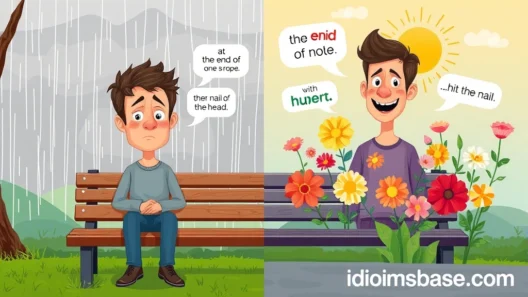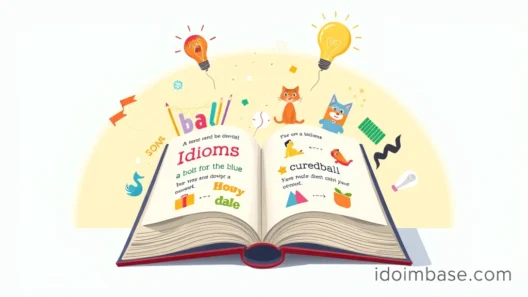Life, oh life! It’s a grand adventure, isn’t it? Full of twists, turns, ups, and downs. We all navigate its intricate pathways, learning and growing with every step. And guess what? English, with its rich tapestry of expressions, has some truly fantastic ways to describe these very experiences! Have you ever found yourself nodding along to a phrase that perfectly captures a moment, even if it doesn't make literal sense? That's the magic of idioms! They're like little linguistic shortcuts, packed with wisdom and often a touch of humor.
Idioms about life offer us a colorful lens through which to view our journey. They help us understand complex feelings, common challenges, and universal truths in a concise and memorable way. Whether you're feeling on top of the world or facing a tough challenge, there's likely an idiom that perfectly encapsulates your situation. So, get ready to unlock a treasure trove of linguistic gems that will not only enrich your vocabulary but also deepen your understanding of the human experience. Let's dive in and explore 35 incredible idioms about life that you absolutely need to know!
35 Idioms About Life
Here are 35 fantastic idioms that speak volumes about life, its challenges, and its joys:
-
A Blessing in Disguise: Have you ever had something seemingly bad happen, only for it to lead to something wonderful? That’s a blessing in disguise! It means something that appears to be a misfortune but turns out to be beneficial.
- Example: Losing my old job was a blessing in disguise; it forced me to pursue my dream career.
-
A Piece of Cake: When something is incredibly easy to do, you can say it’s a piece of cake.
- Example: Learning to ride a bike was a piece of cake for her.
-
Bite the Bullet: Sometimes in life, you just have to face a difficult or unpleasant situation with courage and endurance. That's biting the bullet.
- Example: I had to bite the bullet and work extra hours to meet the deadline.
-
Break a Leg: This is a fun one! It’s a way to wish someone good luck, especially before a performance.
- Example: Before her play, I told her, "Break a leg!"
-
Burning the Midnight Oil: Ever stayed up super late working or studying? Then you've been burning the midnight oil!
- Example: He was burning the midnight oil to finish his project on time.
-
Call It a Day: When you decide to stop working on something for the day, you call it a day.
- Example: After hours of brainstorming, we decided to call it a day.
-
Cost an Arm and a Leg: If something is extremely expensive, it costs an arm and a leg.
- Example: That new car must have cost an arm and a leg!
-
Cry Over Spilled Milk: This idiom means to get upset about something that has already happened and cannot be changed. No use crying over spilled milk, right?
- Example: Don't cry over spilled milk; we can always get more tickets.
-
Cut Corners: To cut corners means to do something in the easiest, quickest, or cheapest way, often by sacrificing quality.
- Example: They cut corners on safety, and it led to problems.
-
Don't Put All Your Eggs in One Basket: This wise advice tells you not to risk everything on a single venture. Diversify your efforts!
- Example: Investing all your savings in one stock is like putting all your eggs in one basket.
-
Every Cloud Has a Silver Lining: Even in difficult situations, there’s usually a hopeful or comforting aspect. Look for that silver lining!
- Example: Losing my job was tough, but every cloud has a silver lining; now I have more time for my family.
-
Get Your Act Together: When someone needs to organize themselves and deal with things effectively, they need to get their act together.
- Example: You need to get your act together if you want to pass this exam.
-
Give Someone the Benefit of the Doubt: To believe someone's statement, even if you have doubts, is to give them the benefit of the doubt.
- Example: I'll give him the benefit of the doubt and assume he had a good reason for being late.

-
Go Down in Flames: If something fails spectacularly, it goes down in flames.
- Example: Their ambitious project went down in flames when funding was cut.
-
Hit the Nail on the Head: When you describe a situation or problem perfectly, you hit the nail on the head.
- Example: Your analysis of the company's issues really hit the nail on the head.
-
In the Same Boat: If you and someone else are in the same difficult situation, you’re in the same boat.
- Example: We're all struggling with the new software, so we're in the same boat.
-
Jump on the Bandwagon: To join a popular trend or activity, you jump on the bandwagon.
- Example: Everyone is buying that new phone, so I decided to jump on the bandwagon.
-
Keep Your Chin Up: This is a wonderful expression of encouragement, meaning to stay cheerful in a difficult situation.
- Example: Things are tough, but keep your chin up; it will get better.
-
Kill Two Birds with One Stone: To achieve two things with a single action, you kill two birds with one stone.
- Example: By cycling to work, I kill two birds with one stone: I save money and get exercise.
-
Let the Cat Out of the Bag: Accidentally revealing a secret is letting the cat out of the bag.
- Example: I accidentally let the cat out of the bag about the surprise party.
-
Miss the Boat: If you miss an opportunity, you miss the boat.
- Example: I really wanted to apply for that scholarship, but I missed the boat.
-
Once in a Blue Moon: Something that happens very rarely happens once in a blue moon.
- Example: My brother lives abroad, so I only see him once in a blue moon.

-
Out of the Blue: When something happens unexpectedly, it happens out of the blue.
- Example: A job offer came out of the blue last week.
-
Pull Yourself Together: To calm down and regain control of your emotions, you pull yourself together.
- Example: After the bad news, she took a deep breath and pulled herself together.
-
Rain on Someone's Parade: To spoil someone's plans or good mood is to rain on their parade.
- Example: I don't want to rain on your parade, but the restaurant is closed.
-
See Eye to Eye: When two or more people agree on something, they see eye to eye.
- Example: We don't always see eye to eye, but we respect each other's opinions.
-
Spill the Beans: Similar to "let the cat out of the bag," this means to reveal a secret.
- Example: Come on, spill the beans! What's the surprise?
-
Take with a Grain of Salt: To understand that something might not be entirely true or accurate, you take it with a grain of salt.
- Example: Take everything he says with a grain of salt; he tends to exaggerate.
-
The Ball Is in Your Court: When it's your turn to make a decision or take action, the ball is in your court.
- Example: I've done all I can; now the ball is in your court.
-
Through Thick and Thin: To support someone through good times and bad times is to be with them through thick and thin.
- Example: True friends stick together through thick and thin.
-
Under the Weather: If you're feeling a bit unwell or sick, you're under the weather.
- Example: I'm feeling a bit under the weather today, so I might go home early.

-
Walk on Eggshells: To be very careful not to offend or upset someone, you walk on eggshells.
- Example: I feel like I'm walking on eggshells whenever I talk to my boss.
-
When Pigs Fly: This idiom means something that will never happen. It's a fun way to express impossibility!
- Example: He'll clean his room when pigs fly!
-
Whole Nine Yards: This means everything, all of it, the complete amount.
- Example: For her birthday party, she wanted the whole nine yards: balloons, cake, music, and a magician.
-
You Can't Judge a Book by Its Cover: This classic idiom reminds us that you shouldn't judge someone or something based solely on their outward appearance.
- Example: He seems shy at first, but you can't judge a book by its cover; he's actually very outgoing once you get to know him.
FAQs About Idioms
Let's address some common questions you might have about idioms and their role in language!
h4 What exactly is an idiom?
An idiom is a phrase or expression whose meaning cannot be understood from the ordinary meaning of its individual words. It's a figurative expression that has a meaning that is culturally understood, rather than literally interpreted. Think of "raining cats and dogs" – it doesn't mean animals are falling from the sky, but rather that it's raining very heavily!
h4 Why are idioms important in English?
Idioms are super important for several reasons! Firstly, they add color, richness, and nuance to language, making conversations and writing more engaging and vivid. Secondly, they reflect cultural understanding and shared experiences, helping us connect with native speakers on a deeper level. Knowing idioms also shows a higher level of fluency and comprehension, as they are often used in everyday conversation, literature, and media. Without understanding them, you might miss the true meaning of a sentence or conversation!
h4 How can I learn and remember new idioms?
Learning idioms can be a fun process! Here are some tips:
- Context is Key: Always try to understand idioms within the context they are used. This helps you grasp their meaning naturally.
- Use Them! The best way to learn is to practice. Try to incorporate new idioms into your conversations or writing. Start with just a few at a time.
- Visual Aids: Some people find it helpful to draw or visualize the literal meaning of an idiom next to its figurative meaning.
- Flashcards: Create flashcards with the idiom on one side and its meaning and an example sentence on the other.
- Read and Listen: Pay attention to idioms when reading books, watching movies, or listening to podcasts in English. Note down any new ones you encounter.
- Thematic Learning: Group idioms by themes (e.g., idioms about money, time, emotions) to make them easier to remember.
h4 Are idioms used differently in formal versus informal settings?
Absolutely! While some idioms are quite versatile and can appear in both formal and informal contexts (like "a blessing in disguise"), many are more suited for informal, casual conversations. Using overly casual idioms in a formal presentation or academic paper might sound unprofessional or out of place. It's always good to gauge your audience and the setting before sprinkling idioms generously. When in doubt, a more straightforward expression might be safer in formal situations.
h4 Do idioms change over time?
Yes, they do! Language is a living thing, and idioms are no exception. Some idioms become outdated and fall out of use, while new ones emerge to reflect current cultural trends, technologies, or societal changes. For example, idioms related to old technologies (like "on the blink" for something broken, relating to old telegraphs) might be less common among younger generations who use newer expressions. This evolution keeps language fresh and relevant!
Key Takeaways
Wow, what a journey through the fascinating world of idioms about life! We've explored expressions that help us talk about challenges, successes, opportunities, and even just the everyday ebb and flow of existence. Here are the key takeaways from our exploration:
- Idioms are the Spice of Language: They add flavor, depth, and character to your English, making your communication more vibrant and engaging.
- They Offer Cultural Insights: Understanding idioms helps you grasp not just the language, but also the nuances of English-speaking cultures. They often reflect shared experiences and common human observations.
- Context is Crucial for Understanding: Always look at the surrounding words and the situation to truly grasp an idiom's meaning. Don't take them literally!
- Practice Makes Perfect: The more you expose yourself to idioms and try to use them, the more naturally they will become part of your vocabulary.
- They Reflect Life's Journey: From "a blessing in disguise" to "through thick and thin," these idioms beautifully capture the universal experiences we all encounter on our life paths.
So, go ahead! Start incorporating these fantastic idioms into your conversations. You'll not only sound more like a native speaker but also gain a deeper appreciation for the colorful ways we express the ups and downs of life. Which one is your favorite? Do you have a story where an idiom perfectly described your situation? Share your thoughts and keep exploring the wonderful world of English!





